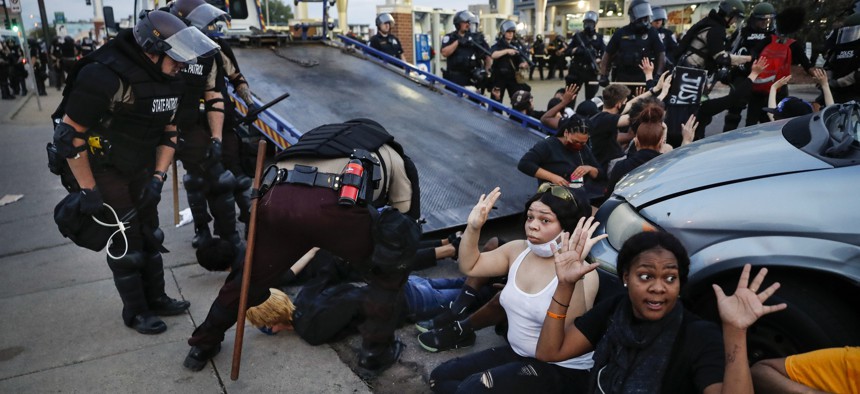Justice Department Issues New Rules to Monitor Oversight of Police

In this May 31, 2020, file photo, protesters raise their hands on command from police as they are detained prior to arrest and processing at a gas station on South Washington Street in Minneapolis. AP Photo/John Minchillo, File
The changes are meant to help minimize the costs of consent decrees to local jurisdictions and to avoid any conflict of interest among the monitors who oversee the reforms.
The Justice Department is implementing new rules for federal monitors tasked with overseeing court-approved state and local law enforcement reforms, Attorney General Merrick Garland announced Monday.
The changes include budget caps on the fees that monitors charge law enforcement agencies as well as term limits for their involvement. The federal monitoring plans are meant to correct civil rights issues within local law enforcement that are uncovered as part of DOJ pattern or practice investigations.
Garland, who announced the new rules as he spoke at an International Association of Police Chiefs conference, said the investigations have helped improve policing practices but acknowledged that they have not always been popular among the departments undergoing the process.
“It is no secret that the Justice Department believes in the value of pattern-or-practice investigations,” Garland said. “It is also no secret that the monitorships associated with some of those settlements have led to frustrations and concerns within the law enforcement community.”
Monitors are hired to oversee implementation of court-approved consent decrees and are meant to serve as independent observers who oversee compliance with the terms.
Past consent decrees have led to overhauls of policing policy and procedure. But many take years to resolve and they often cost local governments millions of dollars. Further, investigations have turned up mixed results among departments that have undergone the costly and time-consuming process.
The new rules for monitors were developed through a process that involved feedback and discussion with current and former monitors, state and local government officials, police chiefs, civil rights attorneys, community leaders and others.
In all, 19 recommendations for the use of monitors will be implemented immediately, according to Garland.
To avoid “even the appearance that a monitor is primarily motivated by profit,” the rules will require consent decrees to cap monitors’ annual fees and will prevent a jurisdiction’s lead monitor from serving on monitor teams for other jurisdictions at the same time, a department memo states.
To ensure that consent decrees do not drag on unnecessarily, the new rules lay out term limits that will require monitors’ progress to be assessed after two to three years. They also allow communities to decide if they want to renew work with the same monitoring team for the rest of the consent decree process.
Because independent monitors work with different jurisdictions, some agencies have complained about the difference in how compliance with the terms of consent decrees is assessed by monitors, the Justice Department memo states. To address that issue, the DOJ will develop more standardized tools that monitors can use during the process.
Pattern or practice investigations were frequently used by President Obama’s Justice Department to root out systemic misconduct and biases and to enact policing reforms but under President Trump, the investigations all but stopped. The Biden administration has restarted the practice, opening three pattern or practice investigations focused on policing in Minneapolis, Phoenix and Louisville, Kentucky.
Andrea Noble is a staff correspondent with Route Fifty.
NEXT STORY: Jim Crow Tactics Reborn in Texas Abortion Law, Deputizing Citizens to Enforce Legally Suspect Provision





